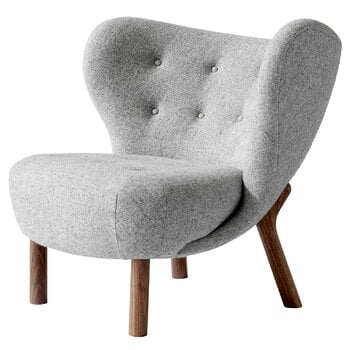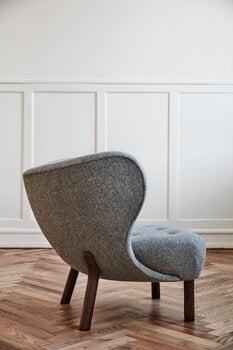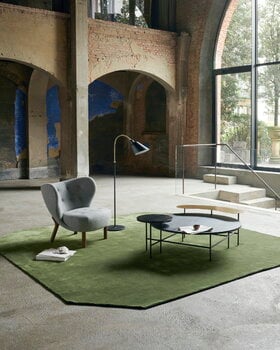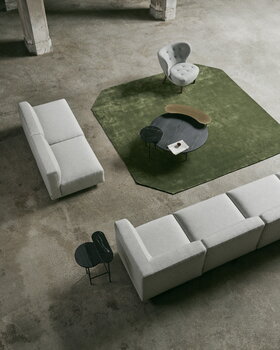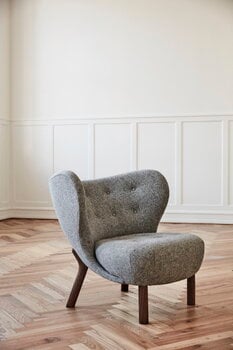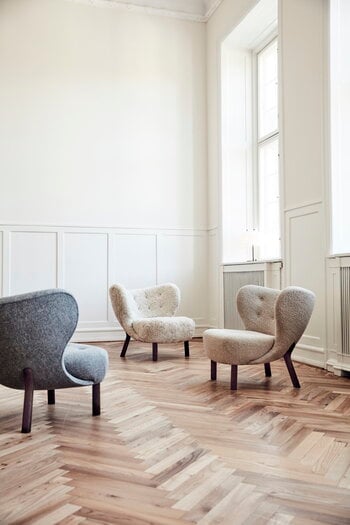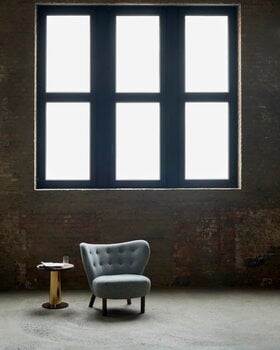&Tradition’s Little Petra lounge chair charms with its compact size, flowing silhouette and soft Hallingdal upholstery. Little Petra was designed by the Danish architect Viggo Boesen, and first introduced at Copenhagen Cabinetmakers Guild Exhibition in 1938. The petite, friendly chair was named after Boesen’s mother-in-law. With its simple and organic appearance, Little Petra is a lovable example of the Danish funkis style of the 1930s. With only about 30 pieces ever produced, the chair became an ultra-rare, highly priced item at auctions. Thanks to &Tradition’s new production, Little Petra is now available to all design enthusiasts around the globe.
Little Petra lounge chair, Hallingdal 130 - walnut
&Tradition
Description
&Tradition’s Little Petra lounge chair charms with its compact size, flowing silhouette and soft Hallingdal upholstery. Little Petra was designed by the Danish architect Viggo Boesen, and first introduced at Copenhagen Cabinetmakers Guild Exhibition in 1938. The petite, friendly chair was named after Boesen’s mother-in-law. With its simple and organic appearance, Little Petra is a lovable example of the Danish funkis style of the 1930s. With only about 30 pieces ever produced, the chair became an ultra-rare, highly priced item at auctions. Thanks to &Tradition’s new production, Little Petra is now available to all design enthusiasts around the globe.
Product details (15)
- Colour
- Grey, walnut
- Width
- 79 cm
- Depth
- 83 cm
- Height
- 75 cm
- Seat depth
- 55 cm
- Seat height
- 40 cm
- Frame material
- Solid beech, plywood
- Seat cushion
- HR foam, polyester wadding
- Backrest cushion
- HR foam, polyester wadding
- Upholstery fabric
- Kvadrat Hallingdal 130: 70% new wool, 30% viscose
- Abrasion resistance
- 100,000 Martindale
- Pilling
- 3
- Lightfastness
- 7
- Weight
- 20 kg
- Notes
- The legs are fitted with felt glides as standard.
- Product ID
Designer
Viggo Boesen was a Danish architect who had a great influence on the Danish functionalism of the 1930s and 1940s. The most essential elements in his work were the use of rattan and different upholsteries, that gave a light and organic touch for his furniture and other designs. One of his best known pieces is the awarded Fox lounge chair, which was made of rattan and released in 1936.
View all productsReviews (0)
Sustainability
The Product Sustainability Framework, our criteria of sustainable design, helps you find the most sustainable products in our selection. Read below which sustainability criteria this product has met.
Working conditions & labour 8/9
-
Equal opportunities for all employees
-
Commitment to UN Global Compact, fair compensation for all employees
-
Corporate responsibility requirements defined and communicated for suppliers
-
Systematic work for improved inclusion and well-being in the workplace
-
Transparent supply chain
-
Suppliers' compliance to a code of conduct ensured
-
Direct suppliers audited and certified
-
Compliance to the UN Guiding Principles on Business and Human Rights ensured in the supply chain
-
Support for community involvement in the supply chain
Eco-friendly production 6/9
-
Fair and resource-wise water-use in production
-
No incineration or landfilling of returned items
-
No use of endangered species as materials
-
No direct environmental emissions or waste (excl. GHGs) from production
-
Material-efficient and ecological packaging
-
No potentially harmful chemicals used in own production
-
The sustainability of direct suppliers' production is addressed and monitored
-
Production and material sourcing that respect biodiversity, animal rights, and natural ecosystems
-
Positive impact on nature’s well-being through operations that regenerate natural ecosystems
Climate impact 5/8
-
Company's direct greenhouse gas emissions identified and commitment to reduction
-
Product's carbon impact identified and commitment to reduction
-
Guidance on energy- and eco-efficient use of the product
-
Contribution to climate initiatives beyond the brand’s direct operations
-
100 % renewable energy in own production and operations
-
Low-carbon or compensated transportation
-
Carbon footprint of the product calculated and goals set to reduce it
-
Carbon neutral or carbon negative product
Sustainable materials 3/6
-
Sustainable and long-lasting material choices
-
No harmful or hazardous substances
-
Responsible raw material sourcing and production
-
Materials suited for circularity: monomaterials, recyclable finishings, renewable or recycled contents etc.
-
Ecological materials: natural, biodegradable, recyclable or recycled contents
-
Outstanding materials in terms of innovativeness, responsibility, sustainability and circularity: local production or sourcing, 100 % recycled content, C2C-certification etc.
Circular design 4/5
-
High aesthetic quality promoting long-term use of the product
-
Technically durable product design and material choices
-
Design for enduring life-long quality
-
Design and support for product maintenance, repair and upgradability
-
Innovative circular design solutions: circular service system, resale platform, remanufacturing, collection of used products, etc.
